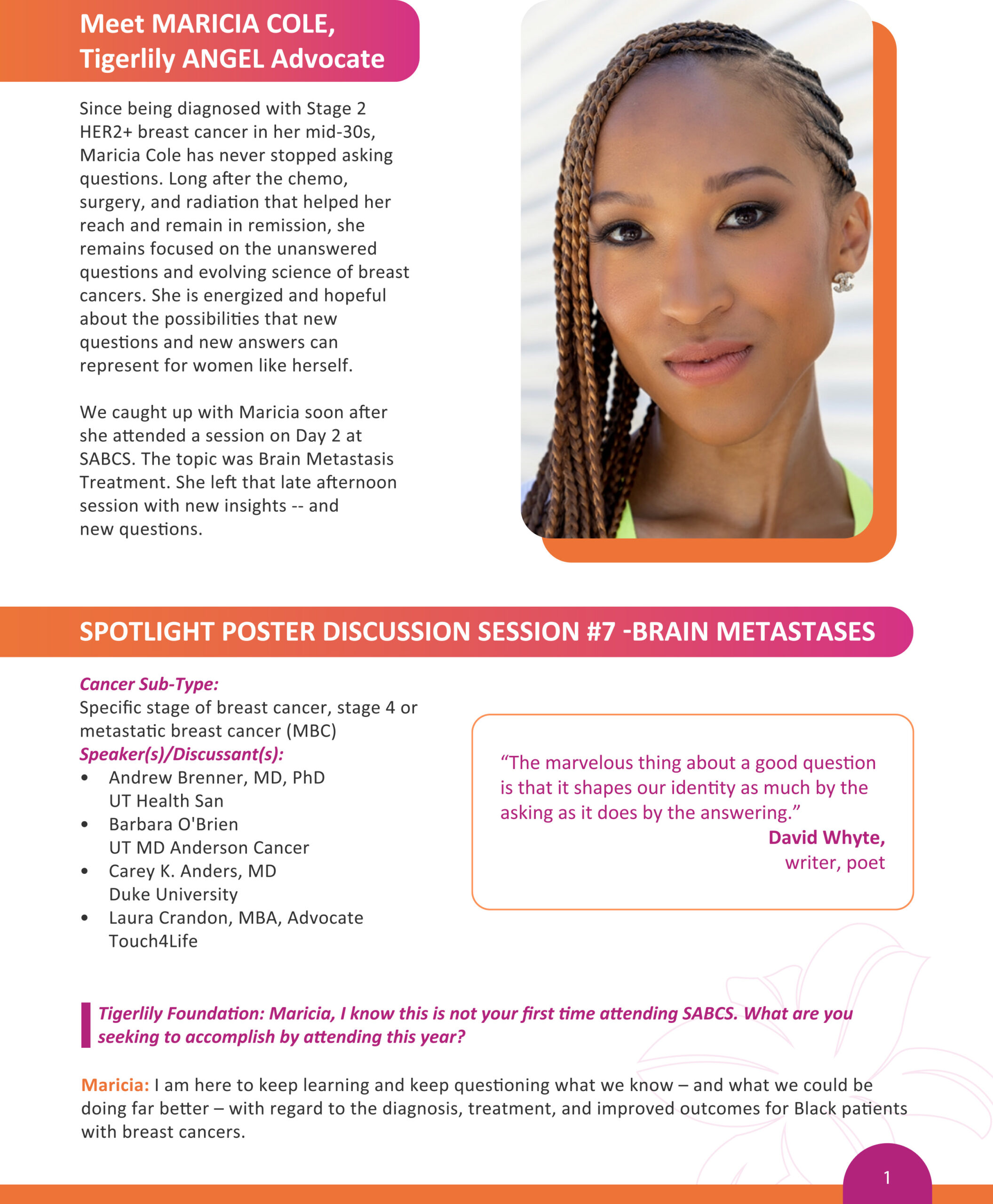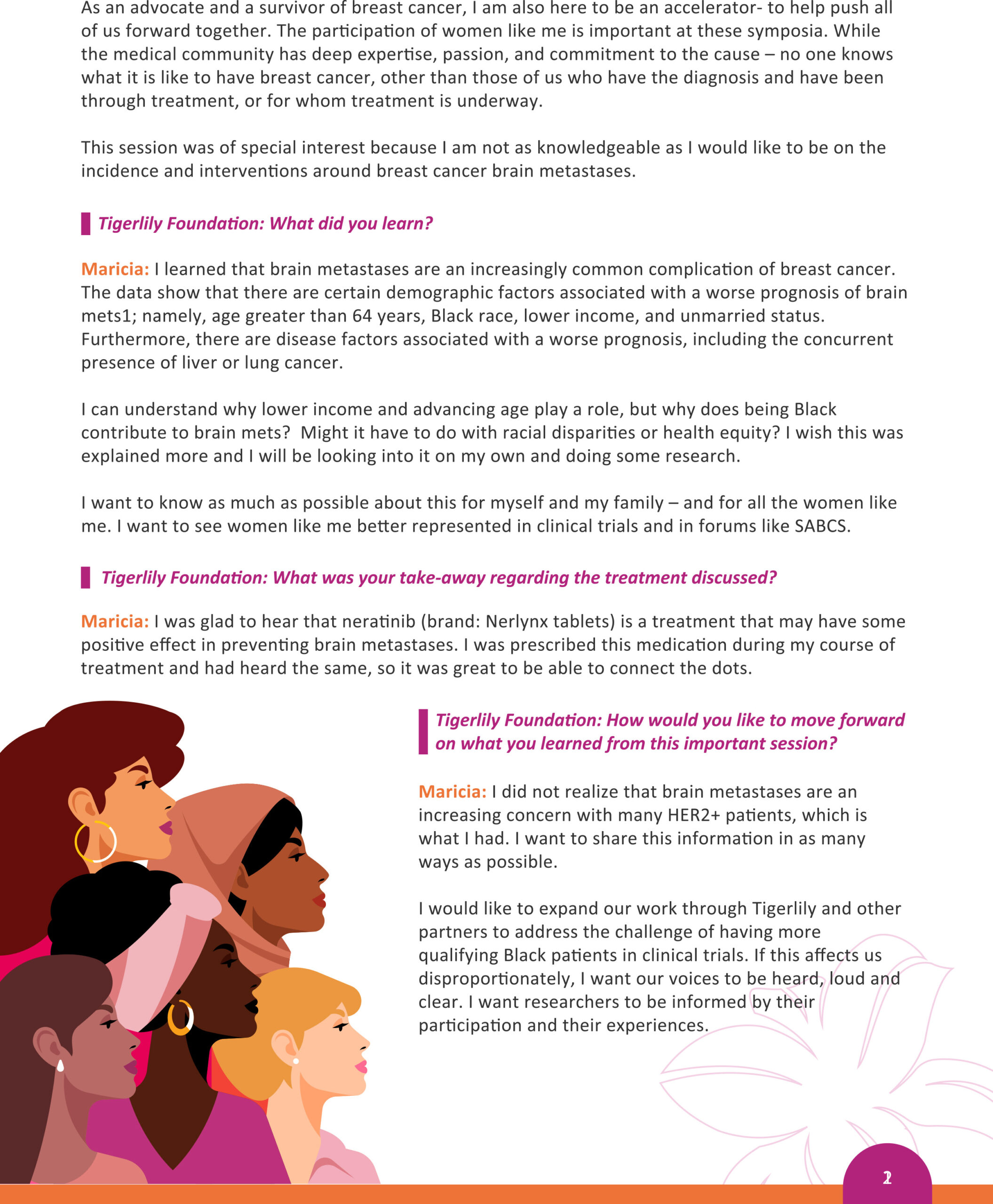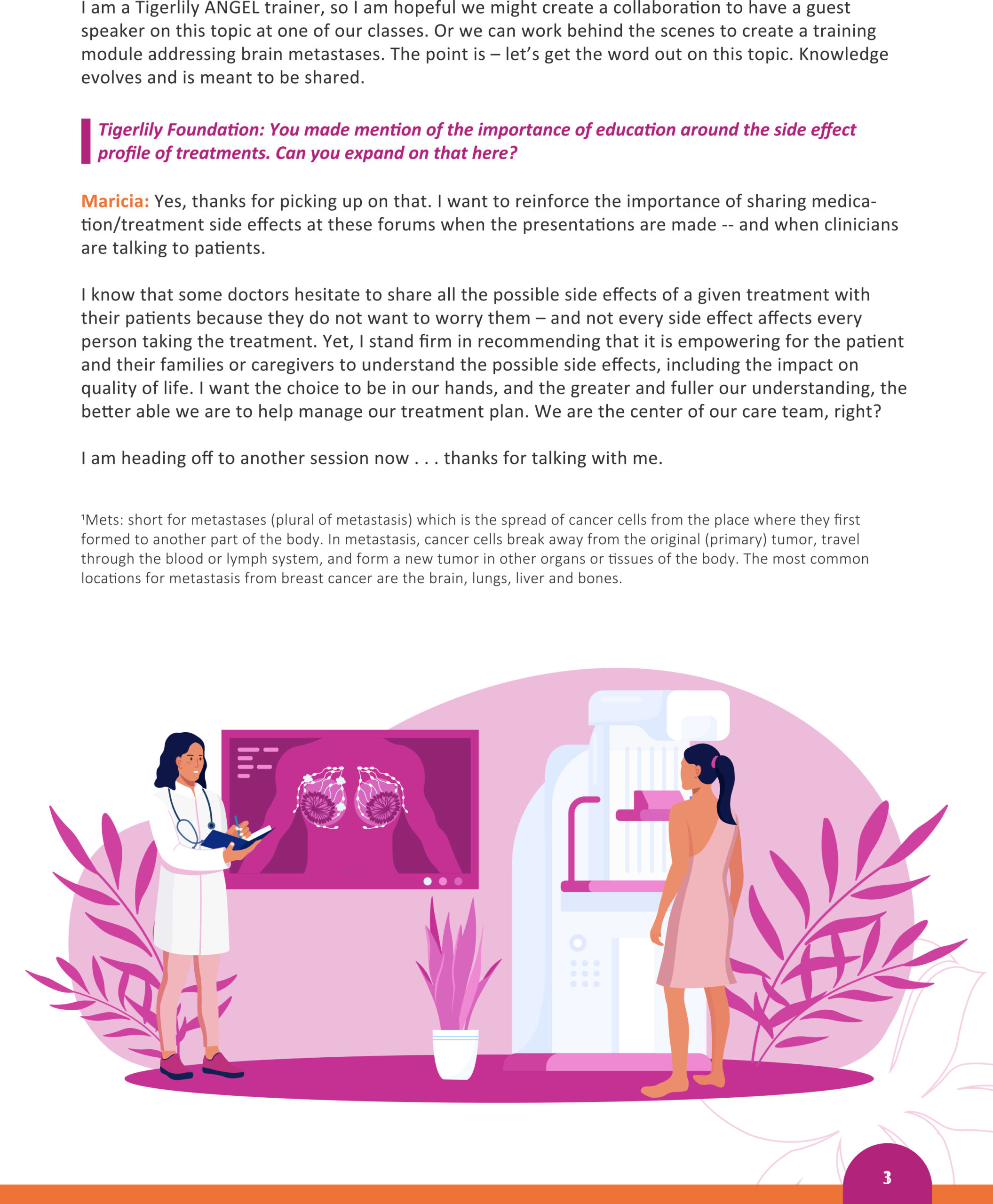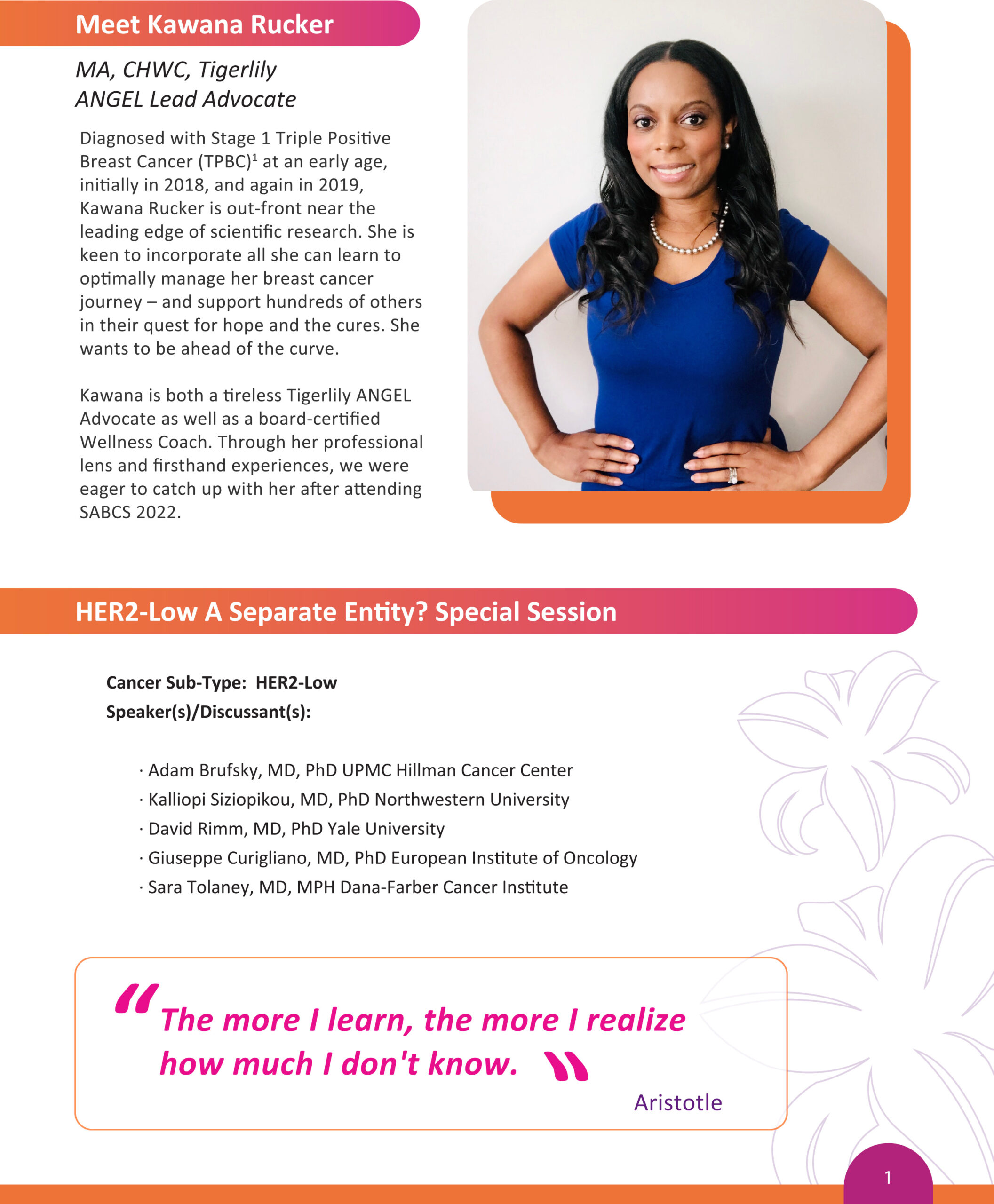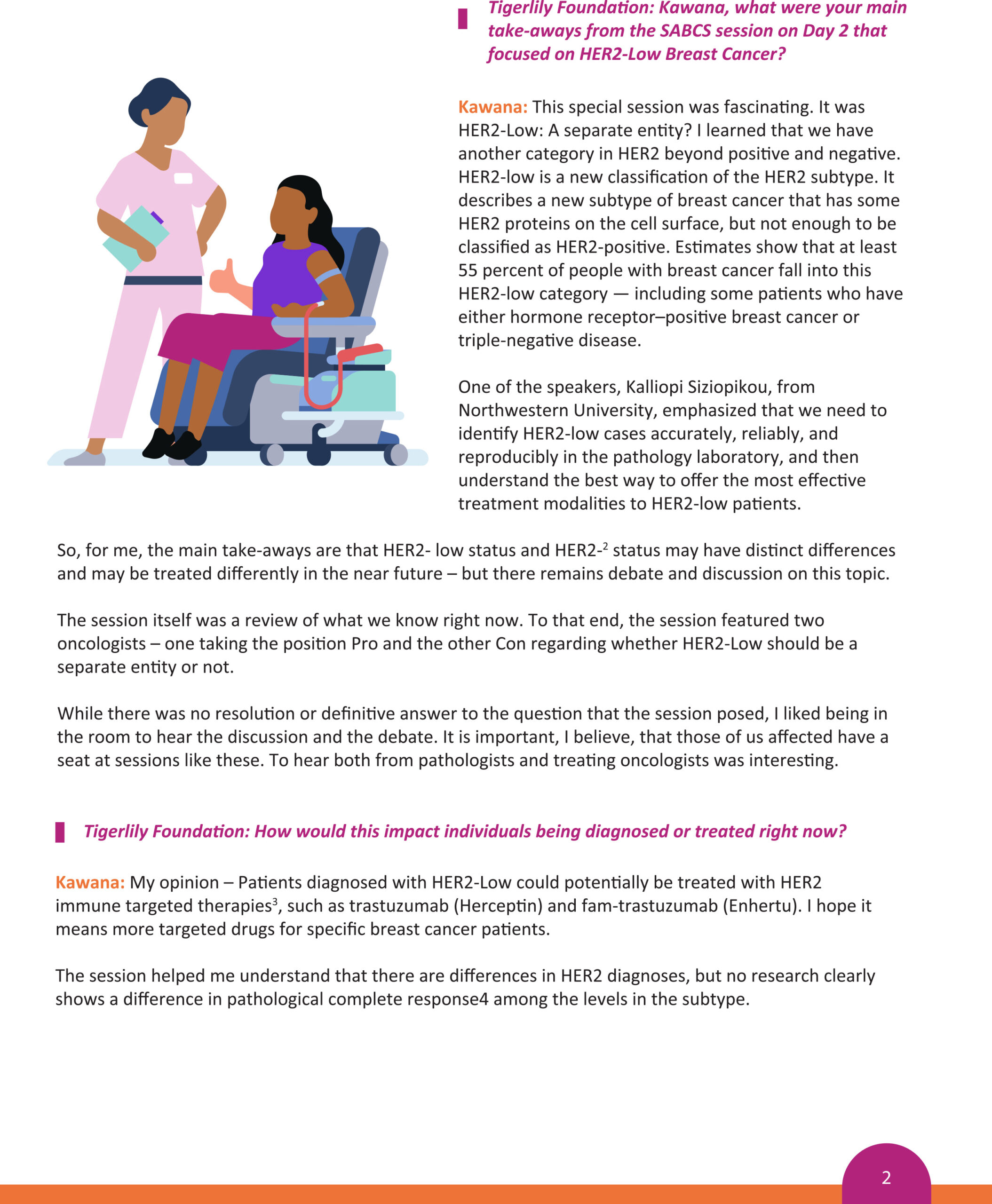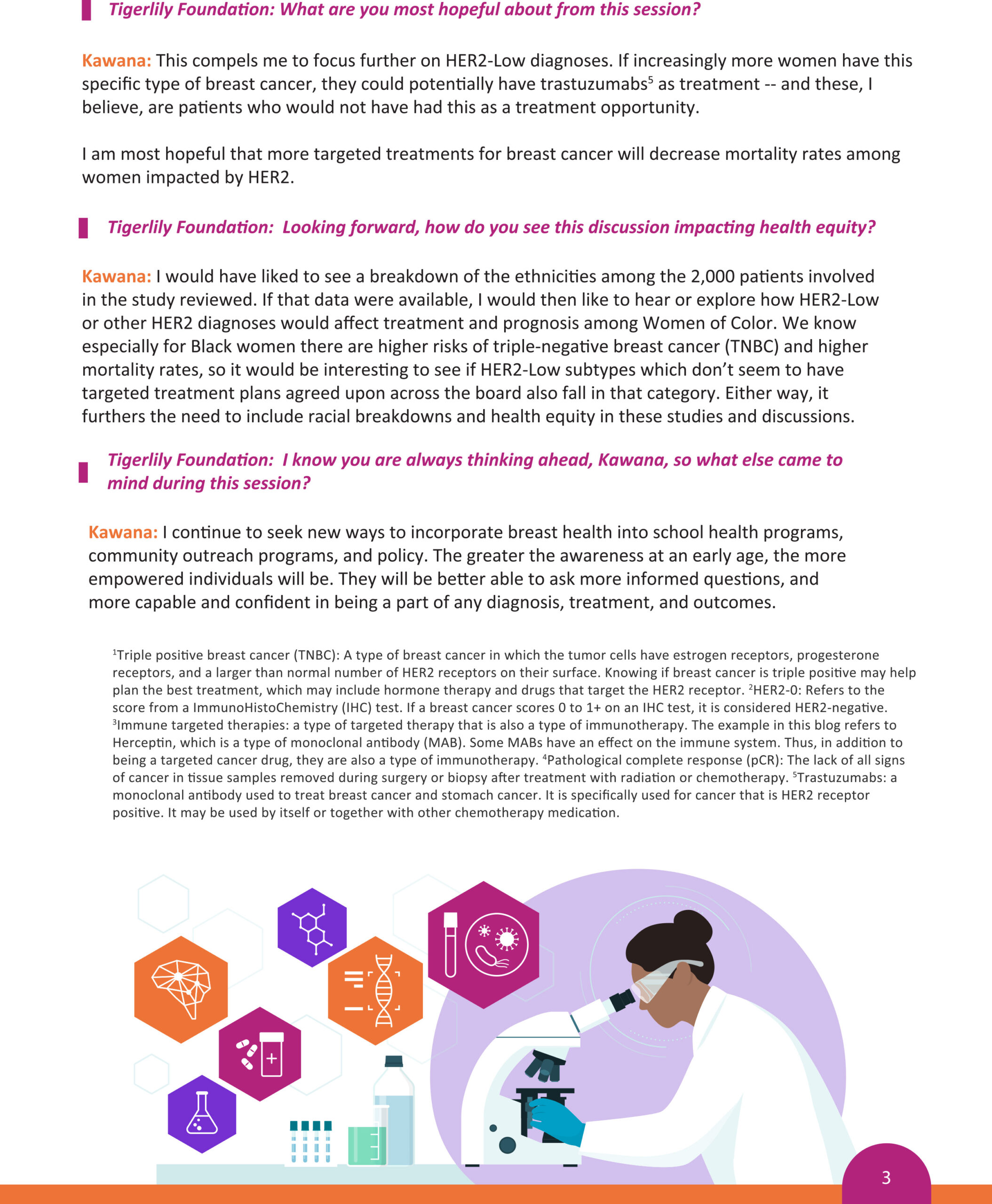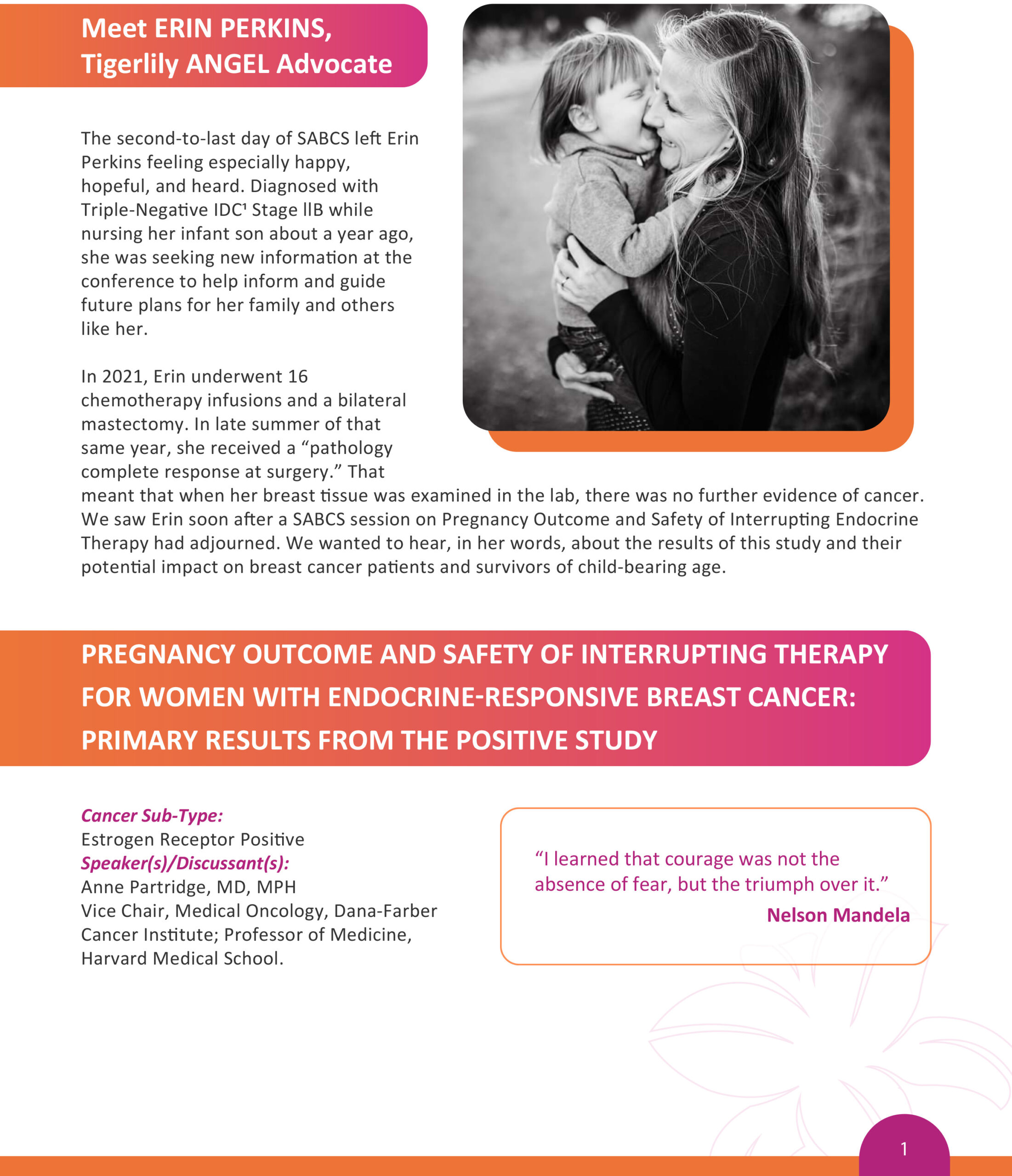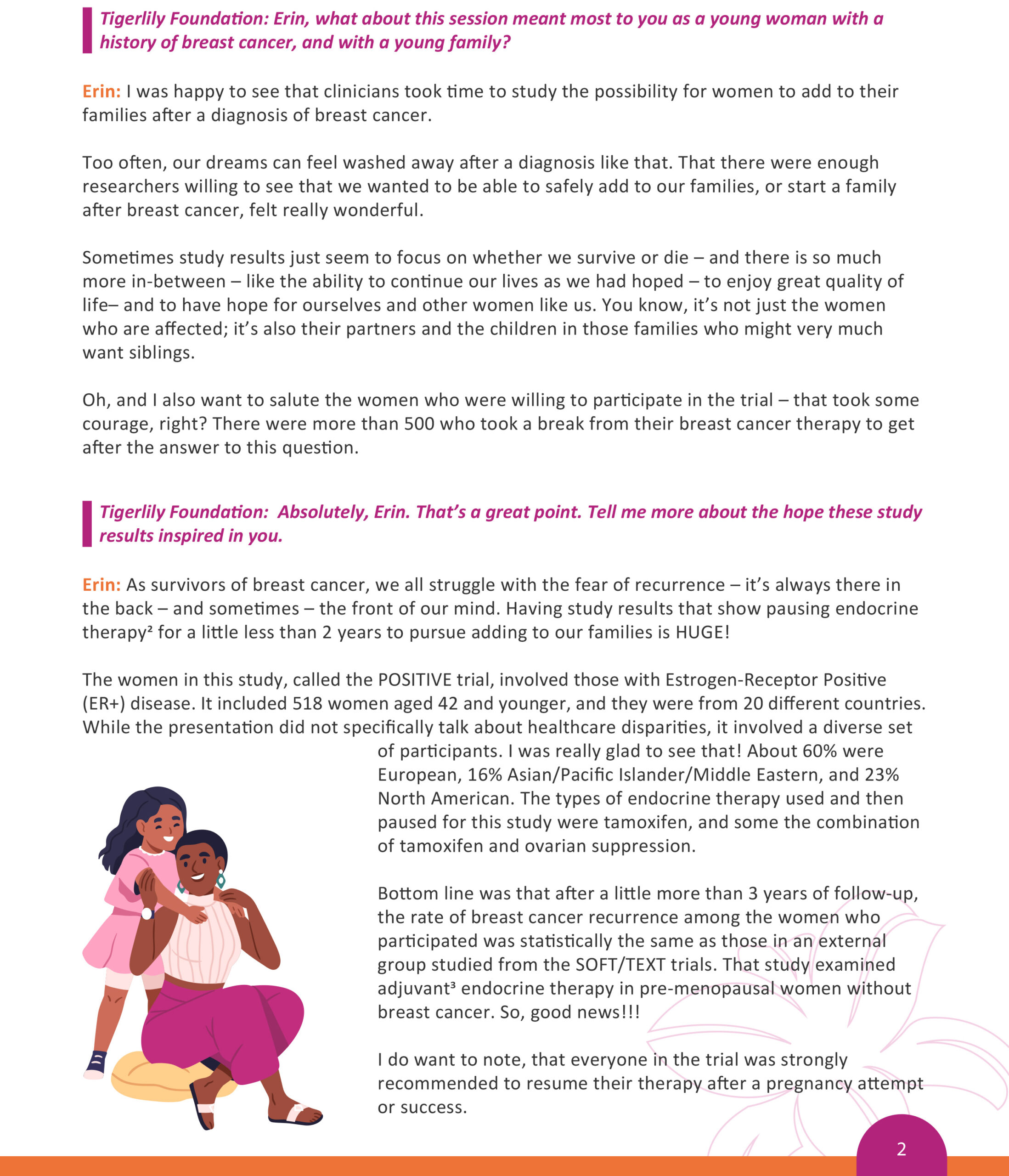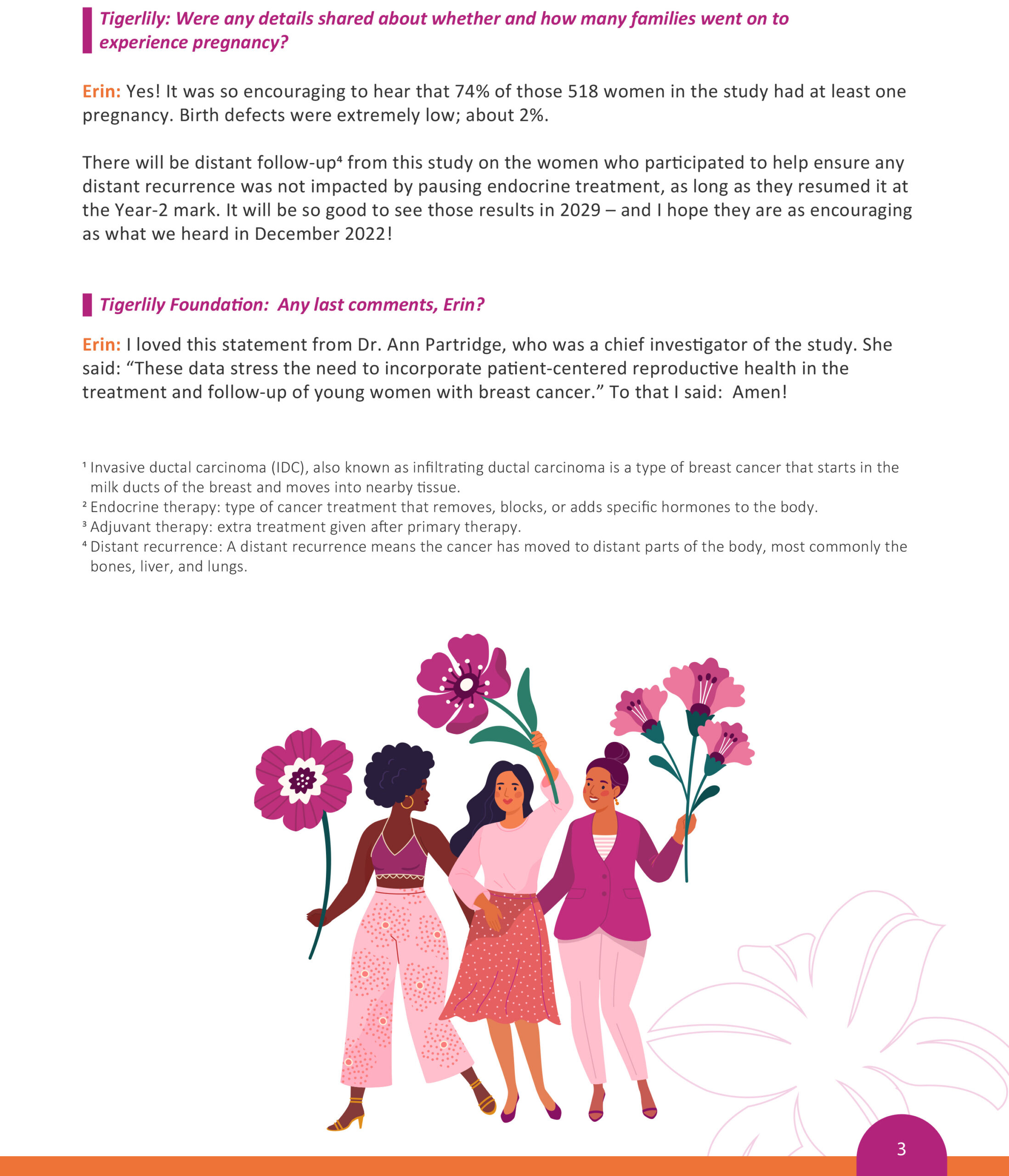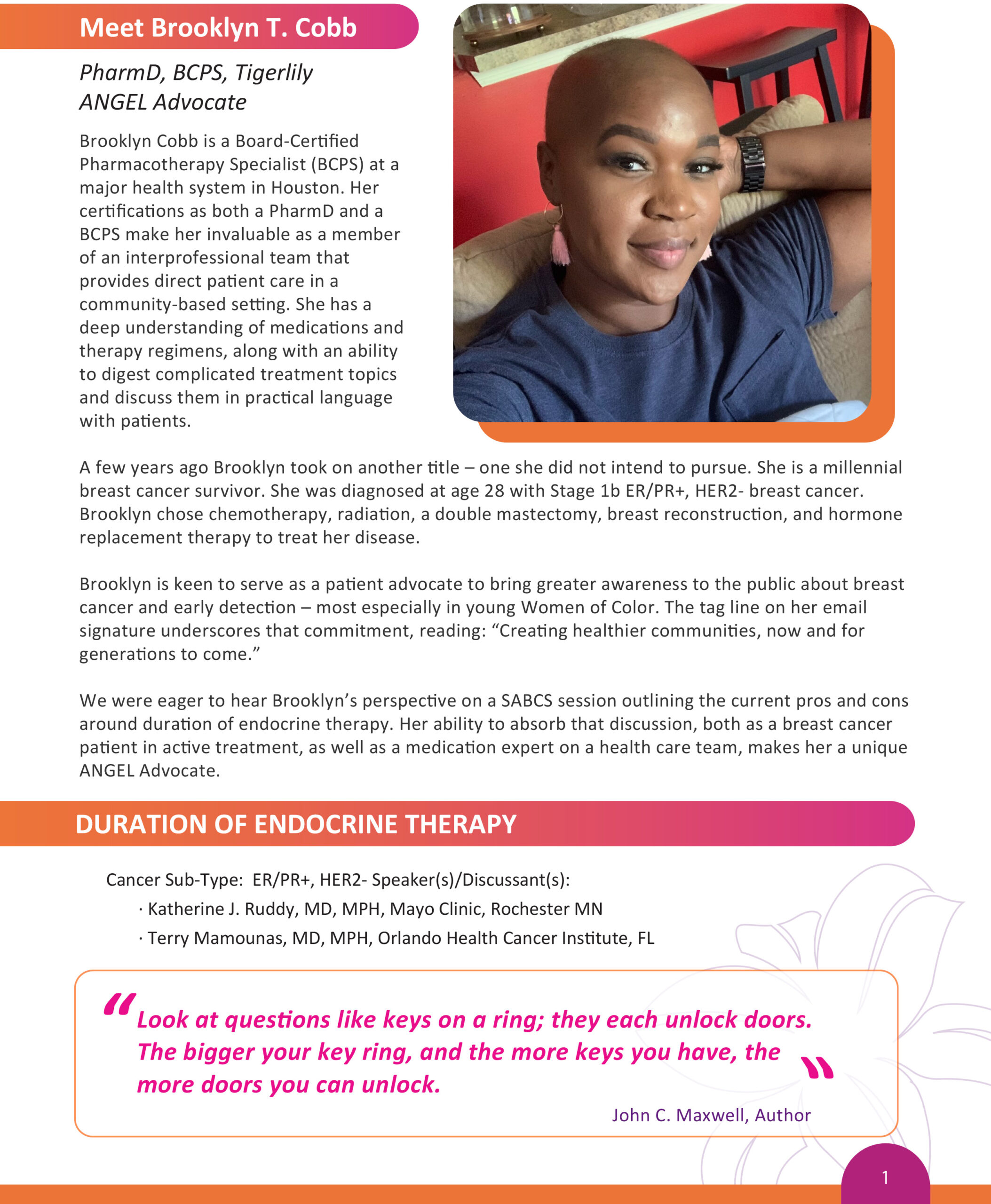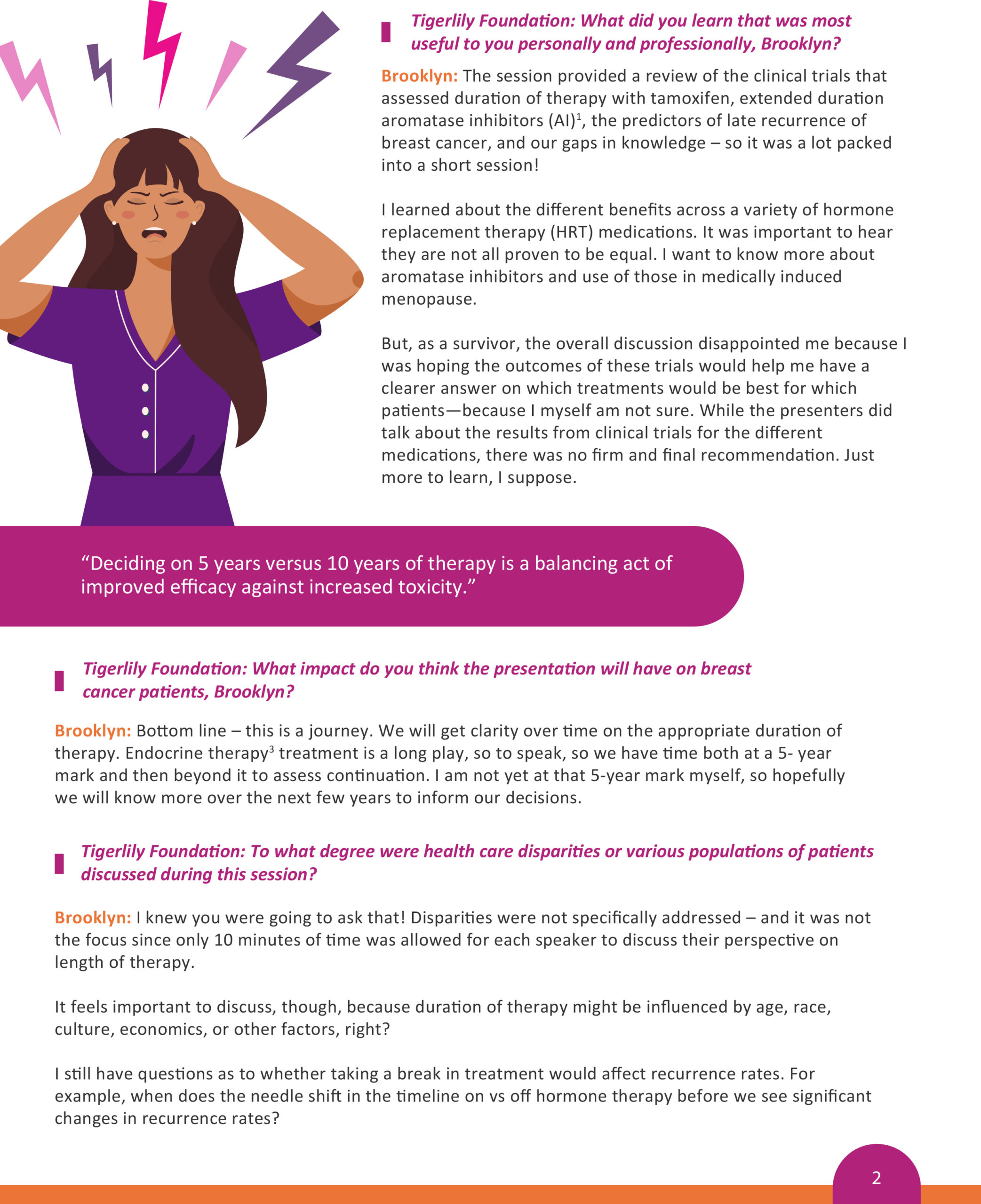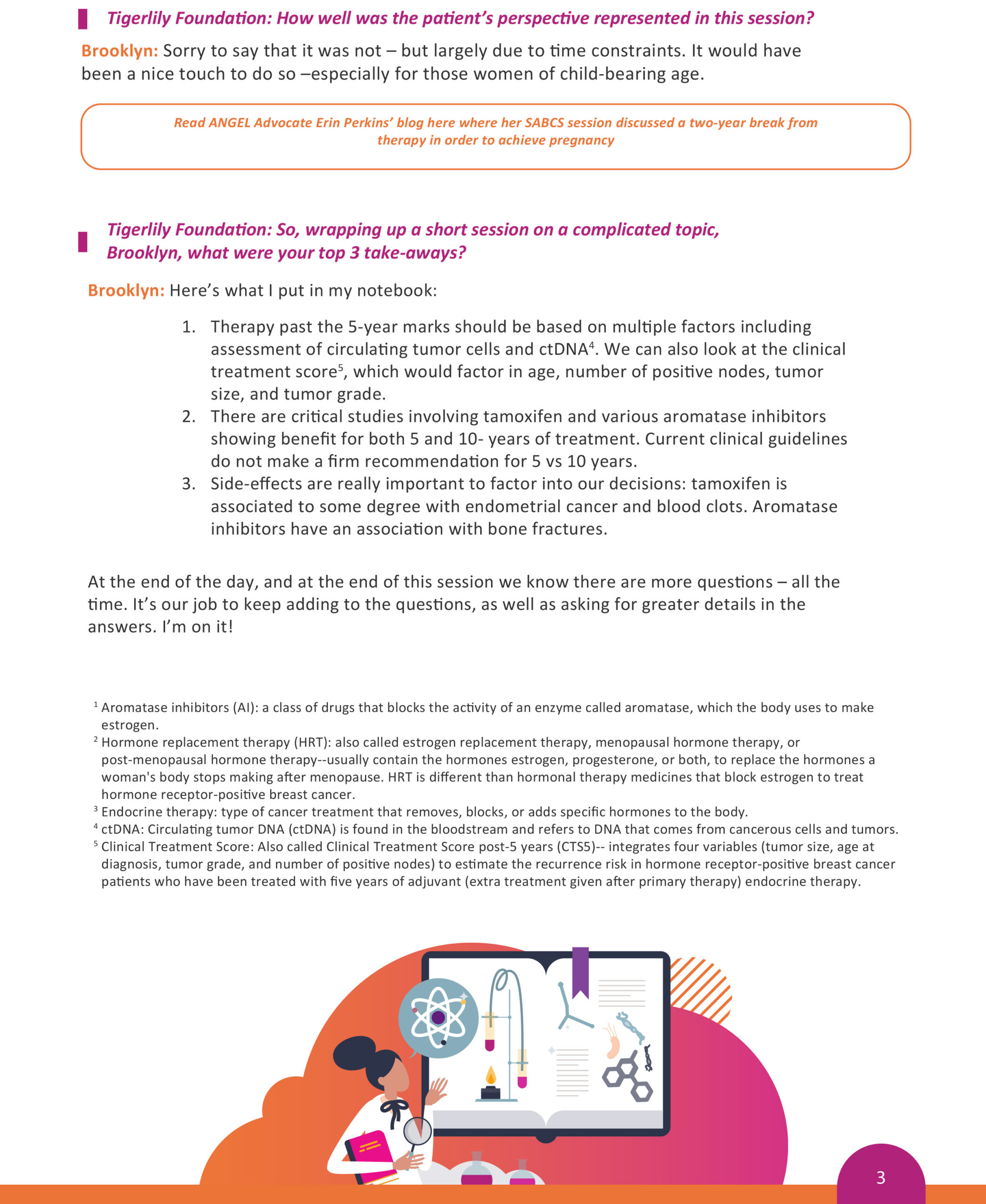
SABCS

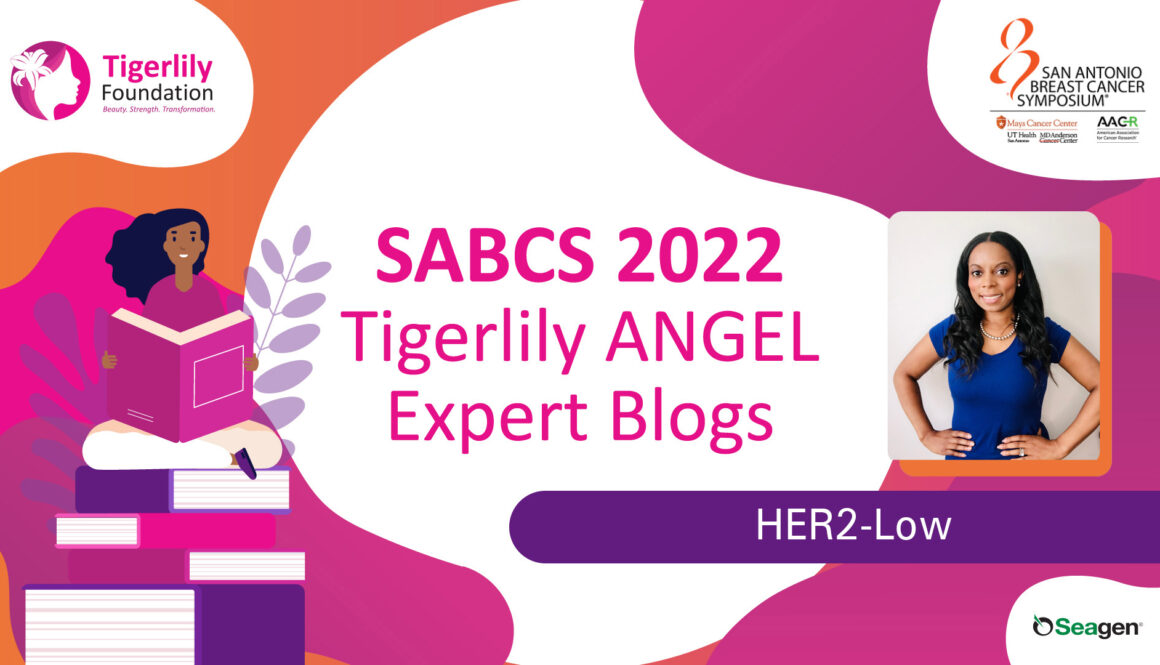
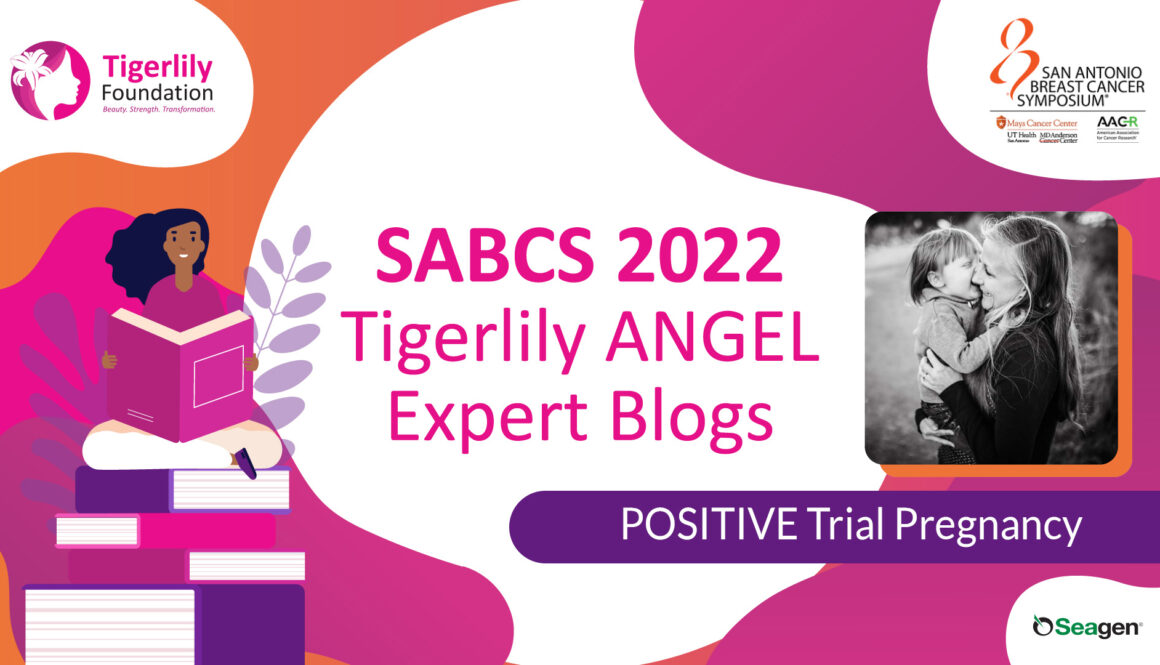
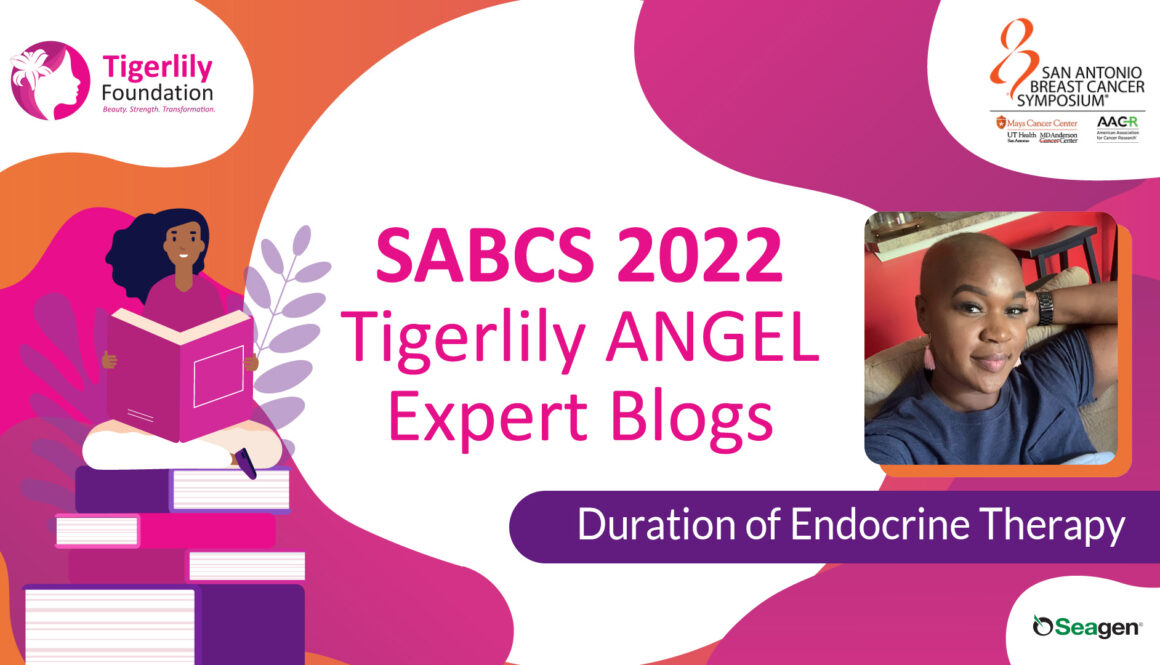
Takeaways from SABCS Session: Diversity in Clinical Trials with ANGEL Advocate Erin Perkins
Read more to learn about some insights, reflections, and opinions of patient advocates who attended SABCS. We’re sharing a little about each Tigerlily ANGEL Advocate, their story, and why they decided to participate in SABCS 2021.
Erin Perkins was diagnosed January 28th, 2021, at age 34 with invasive ductal carcinoma Stage 2B while nursing her son. She was also triple-negative. Triple Negative Breast Cancer (TNBC) is one of the most aggressive types of breast cancer, and is diagnosed often in younger Black women. In spite of the diagnosis and the treatment she faced, while undergoing sixteen chemotherapy infusions and a bilateral mastectomy, Erin knew that she wanted to learn more about breast cancer and be a voice for other patients.
Advocacy is in Erin’s heart—through and through. And it has been, even prior to her breast cancer diagnosis. Erin’s advocacy is woven deep into the fiber of her being and she leverages her power and her privilege through her voice. Erin attended multiple sessions on the first day of SABCS, one of which was Trust in Science and Healthcare: Diversity In Clinical Trials. Here are some thoughts and notes that Erin shared with us from her first day at SABCS.
Tigerlily Foundation: What were your main takeaways from this session?
Erin: Minority populations are sometimes not informed of clinical trials. Patients are not necessarily unwilling, but unable to participate. However, this time impacts our ability to engage in trials to contribute to treatments that work better for our bodies, and time is a disparity! We need to hold researchers accountable to change, and accountability is needed so that money is not prioritized over patient’s needs.
Tigerlily Foundation: What new information did you learn that you want to learn more about?
Erin: I am very interested in learning more about the Diverse Clinical Trial Act by the American Cancer Society.
Tigerlily Foundation: What part of the continuum of care was addressed?
Erin: Practitioners must invest in cancer care programs that adequately receive the patient. The keyword is “receiving”. Patient perspective was important with a cross-sector partnership. Addressing research laziness, language gaps, and literacy issues i are important. One of the speakers brought up a common issue for patients of color contributing to worse outcomes. That is the belief, “I don’t want to be screened because I don’t have the resources to treat it if I have it [breast cancer].” There is a need here for comprehensive resources.
Tigerlily Foundation: Were disparities discussed or addressed? How so?
Erin: YES! This session was 100% about the disparities in healthcare and ideas for how to work towards filling in these gaps.
Tigerlily Foundation: Was your perspective influenced in any way after the session? If so, how?
Erin: I just think of how the panelist brought up a reason some people in underserved populations (largely due to systemic racism) almost have no choice at better outcomes; thinking of how the panelist spoke about a person who would not get screened because they could not afford (because of a myriad of factors) to get it treated anyway, so they might as well not even know. What a motivator for us all to listen and learn and work together to create pathways for all to receive equal access to the care we all deserve.
_______
This content is sponsored by our Partners at Seagen, Pfizer, and Puma Biotechnology.
The session was moderated by Tigerlily Foundation’s President, Maimah Karmo; and Dr. Charles Perou, May Goldman Shaw Distinguished Professor of Molecular Oncology Research, Professor of Genetics & Pathology at the Lineberger Comprehensive Cancer Center, University of North Carolina.
Speakers for this SABCS Special Series Included: Lori L. Wilson, MD, Associate Dean of Diversity and Faculty Development, Howard University College of Medicine, Deborah Stroman PhD, UNC Health Equity and Social Justice, Lisa C. Richardson, MD, Director, Division of Cancer Prevention and Control, CDC, Olufunmilayo I. Olopade, MD, FACP, Director, University of Chicago, Daniel Calac, MD, Chief Medical Officer, Indian Health Council, Inc, George Sledge, Jr., MD, Professor of Medicine (Oncology), Stanford Cancer Center, Melissa B. Davis, PhD, Associated Professor in Surgery, Weill Cornell Medicine, Darcy Burbage, DNP, RN, AOCN, Na’Diah Smith, Patient Advocate, Aliya Whipple, Patient Advocate, Lauren Candies Tarpley, AYA Breast Cancer advocate, Published Author, Erica Stringer-Reasor, MD, Associate Professor of Medicine, Director Breast Cancer Program, University of Alabama – Birmingham, Eric P. Winer, MD, Chief, Division of Breast Oncology Center, Dana-Farber Cancer Institute, Amelie G. Ramirez, Dr.P.H., M.P.H., Chair, Department of Population Health Sciences, UT Health San Antonio, Elena Martinez, PhD, Professor UC San Diego Moores Cancer Center, Sophia George, PhD, Research Associate Professor, University of Miami Cancer Center, Thelma Brown, Patient Advocate, Ysabel Duron, Patient Advocate, and Ashley Dedmon, Patient Advocate.
A Closer Look at SABCS with Maricia Cole, Tigerlily ANGEL Advocate
Maricia Cole was an otherwise healthy young mother when she was diagnosed with Stage 2 HER2+ breast cancer at the age of 36. She is now in remission following chemo, surgery, and radiation and she wants anyone listening to know they are not alone in the fight against breast cancer.
Along with several other Tigerlily ANGEL Advocates, Maricia attended the SABCS Special Session: Trust in Science and Healthcare Co-Hosted by Maimah Karmo and Dr. Charles Perou. This session featured speakers: Dr. Erica Stringer-Reasor, Dr. Eric Winer, Dr. Amelie Ramirez, Dr. Melissa Davis, Sophia George, Dr. Lori Wilson, and Patient Advocates: Thelma Perry Brown, Ysabel Duron, Ashley Dedmon, Darcy Babage. We asked Maricia to share her thoughts and notes from the session from her point of view as a Patient Advocate.
Tigerlily Foundation: Maricia, tell us why were you interested in participating in SABCS?
Maricia Cole: I’ve heard so many good things about SABCS and wanted to see for myself. I want to be a voice for young Black Women with early stage breast cancer so they know they are not alone and that there are resources for them.
Tigerlily Foundation: That’s amazing! What are you looking forward to learning at SABCS?
Maricia Cole: I like statistics. Numbers don’t lie. In general, I’m looking to learn more statistical information about breast cancer patients
Tigerlily Foundation: If you could summarize this session briefly, what would you describe as your main takeaways?
Maricia Cole: This session really highlighted how trust in science can be built. The discussion was very powerful from our very own Maimah Karmo as a Moderator, as well as from Physician and Breast Cancer Survivor herself, Dr. Lori Wilson, and patient advocates like Na’Diah Smith and Ashley Dedmon. The session was great. One of my main takeaways was how important it is for everyone to have equitable care. Equal care = equal outcomes, thus reducing the huge gap in mortality rates of minority communities.
Tigerlily Foundation: So what did you get out of that session?
Maricia Cole: The background was about how we can come to a solution to improve trust in science. What do we do next?
Tigerlily Foundation: What parts of the continuum of care were addressed in this session?
Maricia Cole: Education, diagnosis, and survivorship were addressed
Tigerlily Foundation: Did you find that disparities were discussed or addressed? How so?
Maricia Cole: Yes, it was a large part of the conversation. Especially financial disparities.
Tigerlily Foundation: Was the presentation inclusive or represent voices and issues from patients of color? Young patients? Patients living with MBC (Metastatic Breast Cancer)?
Maricia Cole: Yes, the physician who began the session, Dr. Lori Wilson was diagnosed with MBC, so she is a patient as well as a physician. The patient advocates were young and of color. Inclusivity was prevalent in this session.
Tigerlily Foundation: Was your perspective influenced in any way after the session? If so, how?
Maricia Cole: Yes, my perspective was influenced in a positive way to continue the fight. Because we truly have so many people who are on the same page and ready to do the work in order to improve the overall trust in science. Especially in clinical trials, thus reducing death rates among minority communities for patients with breast cancers.
_____________
This content is sponsored by our Partners at Seagen, Pfizer, and Puma Biotechnology.
Speakers for this SBACS Special Series Included: Lori L. Wilson, MD, Associate Dean of Diversity and Faculty Development, Howard University College of Medicine, Deborah Stroman PhD, UNC Health Equity and Social Justice, Lisa C. Richardson, MD, Director, Division of Cancer Prevention and Control, CDC, Olufunmilayo I. Olopade, MD, FACP, Director, University of Chicago, Daniel Calac, MD, Chief Medical Officer, Indian Health Council, Inc, George Sledge, Jr., MD, Professor of Medicine (Oncology), Stanford Cancer Center, Melissa B. Davis, PhD, Associated Professor in Surgery, Weill Cornell Medicine, Darcy Burbage, DNP, RN, AOCN, Na’Diah Smith, Patient Advocate, Aliya Whipple, Patient Advocate, Lauren Candies Tarpley, AYA Breast Cancer advocate, Published Author, Erica Stringer-Reasor, MD, Associate Professor of Medicine, Director Breast Cancer Program, University of Alabama – Birmingham, Eric P. Winer, MD, Chief, Division of Breast Oncology Center, Dana-Farber Cancer Institute, Amelie G. Ramirez, Dr.P.H., M.P.H., Chair, Department of Population Health Sciences, UT Health San Antonio, Elena Martinez, PhD, Professor UC San Diego Moores Cancer Center, Sophia George, PhD, Research Associate Professor, University of Miami Cancer Center, Thelma Brown, Patient Advocate, Ysabel Duron, Patient Advocate, and Ashley Dedmon, Patient Advocate.
A Closer Look at SABCS with Erin Perkins, Tigerlily ANGEL Advocate
Erin Perkins was diagnosed January 28th, 2021, at age 34 with Triple-Negative Breast Cancer (TNBC) with invasive ductal carcinoma Stage 2B while nursing her son. While undergoing 16 chemotherapy infusions and a bilateral mastectomy, Erin knew that she wanted to learn more about breast cancer and be a voice for other patients.
Advocacy is in Erin’s heart—through and through. And it has been, even prior to her breast cancer diagnosis. Erin’s advocacy is woven deep into the fiber of her being and she leverages her power and her privilege through her voice. Erin attended multiple sessions on the first day of SABCS, one of which was Trust in Science and Healthcare: Advancing Health Equity Built on Trust. Here are some thoughts and notes that Erin shared with us from her first day at SABCS.
Tigerlily Foundation: What was the background information you received that was helpful in attending this Special Session?
Erin Perkins: I loved Dr. Deborah Stroman’s allegory about perspective. We need to ask “What is wrong with the lake? How can we fix the water?” Because people continue to be harmed and die unnecessarily.
Tigerlily Foundation: There is a lot of information included in these sessions. What new information did you receive that inspires you to research more after SABCS?
Erin Perkins: STEM programs to provide diversity in health systems. Also, in her first point on how to decrease, reduce, and eliminate the disparities, Dr. Stroman said to “pay attention to NIH’s Unite Initiative”, and I do not know what that is. I found the mention of understanding bias at a younger age to close the gap earlier coupled with the mention of STEM programs at earlier ages in diverse communities helping give access and interest for BIPOC to want to become Oncologists as a profession, as representation is needed. (Less than 3% of Oncologists are Black).
Tigerlily Foundation: What was the impact on breast cancer patients, or the importance for breast cancer patients in this series?
Erin Perkins: Cadence of mobile clinics to visit underserved communities, as well as finding a way to close the gap for access to treatment for these patients to be able to finish courses of treatment and have better overall outcomes. Aliya suggested asking for patient feedback after receiving services to help care practitioners do better in the future.
Tigerlily Foundation: Were disparities discussed or addressed? How?
Erin Perkins: YES! This session was 100% about the disparities in healthcare and ideas for how to work towards filling in these gaps. To bridge the gaps we need patient-centric care. Practitioners need to understand and acknowledge the distrust, and frame research in ways that benefit the patient.
Tigerlily Foundation: Was the presentation inclusive or represent voices/issues from patients of color? Young patients? Patients living with MBC? Additionally, how was your perspective influenced by this series?
Erin Perkins: Yes! I was excited to tell my math educator friend in Seattle about how important getting Black students involved in STEM can be, and it just made me hopeful for upcoming change. I also felt this way because the panel was there addressing so many Doctors and researchers, letting them know that these healthcare gaps stem from systemic racism, and as a result, must be intentionally noticed, listened to, and dismantled.
_______
Thank you to Seagen, Pfizer, and Puma Biotechnology for sponsoring this content.
Speakers for this SBACS Special Series Included: Lori L. Wilson, MD, Associate Dean of Diversity and Faculty Development, Howard University College of Medicine, Deborah Stroman PhD, UNC Health Equity and Social Justice, Lisa C. Richardson, MD, Director, Division of Cancer Prevention and Control, CDC, Olufunmilayo I. Olopade, MD, FACP, Director, University of Chicago, Daniel Calac, MD, Chief Medical Officer, Indian Health Council, Inc, George Sledge, Jr., MD, Professor of Medicine (Oncology), Stanford Cancer Center, Melissa B. Davis, PhD, Associated Professor in Surgery, Weill Cornell Medicine, Darcy Burbage, DNP, RN, AOCN, Na’Diah Smith, Patient Advocate, Aliya Whipple, Patient Advocate, Lauren Candies Tarpley, AYA Breast Cancer advocate, Published Author, Erica Stringer-Reasor, MD, Associate Professor of Medicine, Director Breast Cancer Program, University of Alabama – Birmingham, Eric P. Winer, MD, Chief, Division of Breast Oncology Center, Dana-Farber Cancer Institute, Amelie G. Ramirez, Dr.P.H., M.P.H., Chair, Department of Population Health Sciences, UT Health San Antonio, Elena Martinez, PhD, Professor UC San Diego Moores Cancer Center, Sophia George, PhD, Research Associate Professor, University of Miami Cancer Center, Thelma Brown, Patient Advocate, Ysabel Duron, Patient Advocate, and Ashley Dedmon, Patient Advocate.
A Closer Look at SABCS with Kawana Rucker, Tigerlily ANGEL Advocate
Throughout SABCS week, we’ll be sharing some ideas, reflections, and opinions of patient advocates who attended. Each evening, we’ll share a little about each Tigerlily ANGEL Advocate, their story, and why they decided to participate in SABCS 2021.
Kawana Rucker is a two-time Breast Cancer Conqueror, diagnosed in 2018 and again in 2019. Her diagnosis was Stage 1 Triple Positive Breast Cancer both times. She is a patient advocate and Board-Certified Wellness Coach. In addition to being a Tigerlily ANGEL Advocate, she is also on the Community Council Board at Glimmer of Hope Foundation. Kawana advocates for others and helps others advocate for themselves throughout their breast cancer journey.
One of the sessions Kawana attended was the SABCS Special Session: Trust in Science and Health Care. Co-Hosted by Maimah Karmo and Dr. Charles M. Perou, Speakers included Dr. Lori Wilson, Dr. Deborah Stroman, Dr. Eric Winer, Dr. Amelia Ramirez, Patient Advocate Ysabel Duron, and Dr. Olufunmilayo Olopade. We asked Kawana some questions about the special session she attended, her thoughts, and how her perspective was influenced.
Tigerlily Foundation: Kawana, why were you interested in participating in SABCS?
Kawana Rucker: I’m interested in learning about the new research, new studies and sharing my experience as a breast cancer patient and advocate. I’m looking forward to learning more about the CAM therapies that support breast cancer patients.
Tigerlily Foundation: What was the main subject matter and what were your takeaways?
Kawana Rucker: Health Equity. Breast cancer Care is not equitable across all health care. Structural racism must be addressed from the top in order to impact the patient. Fewer than 3 percent of oncologist are black. If all patients get the same treatments in clinical trials the outcomes are the same among races.
Trust in health care is built by the data collection, conversation and when patients are allowed to tell their story. Presenting Cancer teams to patients build trust. The greater the respect in the patient physician relationship, the greater the trust. It is important to Educate, Advocate and conduct research in a culturally relatable way.
Tigerlily Foundation: What was the background information on this topic?
Kawana Rucker: Despite the advances in cancer treatment, patients in the BIPOC community are still dying a greater number’s, more likely to have advanced cancers, less likely to be treated fairly, treated at later stages and adversely impacted racism in care. Less research and trials including women of color.
Tigerlily Foundation: What was new information or new things you learned about that you might want to research later?
Kawana Rucker:
- CDC Cancer training for breast cancer patients.
- Ways to educate and engage the BIPOC community about breast cancer within the community and make it culturally relatable.
- Triple negative breast cancer research genetic disposure Amount of money allocated to clinical trials for BIPOC.
Tigerlily Foundation: What are some questions that you feel like should be considered further pertaining to this subject?
Kawana Rucker:
- How often is breast cancer talked about in schools, homes, churches in the BIPOC communities?
- How can funding be allocated to BIPOC breast cancer patients to participate in clinical trials. This includes the drugs, housing, food etc. if they must travel to participate?
- How do we make breast cancer education, research, and advocacy relatable to the communities in which we serve?
Tigerlily Foundation: What part(s) of the continuum of care was/were addressed?
Kawana Rucker: Treatment, disease progression, treatment resistance, investments, funding, clinical trials, clinical trial availability.
Tigerlily Foundation: Were disparities discussed or addressed?
Kawana Rucker: Yes, Discussion on inequity in cancer care, research, participation in clinical trials.
Tigerlily Foundation: Was the presentation inclusive or represent voices/issues from patients of color? Young patients? Patients living with Metastatic Breast Cancer (MBC)?
Kawana Rucker: Yes, the panel consisted of Women of Color, non-white men, indigenous women, and a Black Physician living with MBC.
Tigerlily Foundation: Was your perspective influenced in any way after the session? If so, how?
Kawana Rucker: This session was phenomenal. It highlighted many of the disparities many of us face as BIPOC in the health care system and particularly the breast cancer community. This session has empowered me to think of more creative ways to insist breast cancer literacy is taught in schools. The more people know about cancer earlier in life the more knowledge they will have if someone they know is diagnosed with cancer. Also highlighted some areas that I can assist my breast cancer patients as a health coach.
________
This content is sponsored by our Partners at Seagen, Pfizer, and Puma Biotechnology.
Speakers for this SBACS Special Series Included: Lori L. Wilson, MD, Associate Dean of Diversity and Faculty Development, Howard University College of Medicine, Deborah Stroman PhD, UNC Health Equity and Social Justice, Lisa C. Richardson, MD, Director, Division of Cancer Prevention and Control, CDC, Olufunmilayo I. Olopade, MD, FACP, Director, University of Chicago, Daniel Calac, MD, Chief Medical Officer, Indian Health Council, Inc, George Sledge, Jr., MD, Professor of Medicine (Oncology), Stanford Cancer Center, Melissa B. Davis, PhD, Associated Professor in Surgery, Weill Cornell Medicine, Darcy Burbage, DNP, RN, AOCN, Na’Diah Smith, Patient Advocate, Aliya Whipple, Patient Advocate, Lauren Candies Tarpley, AYA Breast Cancer advocate, Published Author, Erica Stringer-Reasor, MD, Associate Professor of Medicine, Director Breast Cancer Program, University of Alabama – Birmingham, Eric P. Winer, MD, Chief, Division of Breast Oncology Center, Dana-Farber Cancer Institute, Amelie G. Ramirez, Dr.P.H., M.P.H., Chair, Department of Population Health Sciences, UT Health San Antonio, Elena Martinez, PhD, Professor UC San Diego Moores Cancer Center, Sophia George, PhD, Research Associate Professor, University of Miami Cancer Center, Thelma Brown, Patient Advocate, Ysabel Duron, Patient Advocate, and Ashley Dedmon, Patient Advocate.

